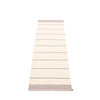Description Hide Description- Show Description+
Eye catching, durable and functional woven plastic floor rugs from Pappelina of Sweden. Each rug represents a piece of Swedish craftsmanship, bought to life through a close interplay between design and weave. Great for any room indoor or out. They are machine washable or simply spot clean and rinse off when required.
Made in Dalarna, Sweden. Woven on a traditional loom using wooden shuttles. Very practical and easy-to-care-for rug in Swedish manufactured PVC. Welded ribbon for strength and durability, with embossed Pappelina logo, at both edges. Measurements may vary ±4% as a result of the various craft processes our rugs are undergoing during manufacturing.
Leadtimes:- Please contact us at info@luumodesign.com to enquire on stock on hand and leadtimes for special orders
Colour: Pink and white
Materials: Plastic weave
Dimensions:
60 x 85cm
60 x 125cm
60 x 200cm
85 x 200cm
140 x 200cm
After four years in the USA, Lina Rickardsson returned to her hometown of Falun in central Sweden. There, she came upon an old schoolhouse, home to a weavers’ association. With her life-long interest in weaving, it came as no surprise that Lina ended up behind a loom. I felt comfortable there, she explains. This was how it all began, when Lina was twenty-four.
Shortly after, she moved to Gothenburg on the west coast of Sweden, where she took courses in painting and weaving. Her passion was the weaving, and soon, after noticing the interest in her work, Lina decided this would be her focus.
With her products – linen rugs and paper placemats – in the crook of her arm, she visited possible retailers in Gothenburg. The boutique Norrgavel, with stores in Stockholm, Malmö and Gothenburg, were delighted with Lina’s handwoven rugs and ordered twenty-four. Her interest became both a profession and a business.
The brand name Pappelina was born – the name a wordplay of “paper” and “linen”.
Quickly, however, Lina realized that she would be unable to do all the weaving herself and began seeking out a weaving mill. At this time in Sweden, most such mills were struggling, many having already closed down. Finally, she discovered a small family-owned mill in Dalarna, in the heartland of Sweden, that had been weaving in linen since the fifties. She was welcome to set up a traditional loom alongside its three employees.
While there, Lina discovered a wealth of colourful plastic ribbons that had been used to make rugs in the seventies. Immediately, she was inspired to create experimental “new” rugs of plastic in which the bold-coloured plastic itself would be the focus. Using a new tying technique and twice as much material as normal, she created a rug that would be the first of its kind on the market.
Initially, the weavers at the mill were skeptical. The rug would most likely not sell since the price would be too high due to the exceptionally large amount of material involved. But Lina believed in her idea: the new, thick, colourful plastic rug made its first appearance in January 2000 at the Formex trade fair in Stockholm. The interest in the new plastic rug changed Lina’s focus: she sold 124 rugs in plastic and twelve in linen.
At Formex in August 2001, Lina exhibited her plastic rug BOB – a classic square-stripe design woven using a technique to give a soft, generous feel. It was awarded the distinction Formex Formidabel 2001 for best textile.
The following year, the VERA rug made its debut at Formex. VERA was the first rug produced using the jacquard technique, which allows for free-form patterns. Success was immediate!
At times, Lina recalls those 124 rugs she sold at that first trade fair that marked the start of everything. Today, Pappelina weaves some 100 000 rugs each year, has some forty employees in Dalarna and markets to 26 countries.
Pappelina still weaves its rugs in the Dalarna mill. Production costs are higher compared to many other countries, yet the goal has always been to create a brand name that stands for quality and pride. This is best achieved by weaving the rugs in Sweden.







